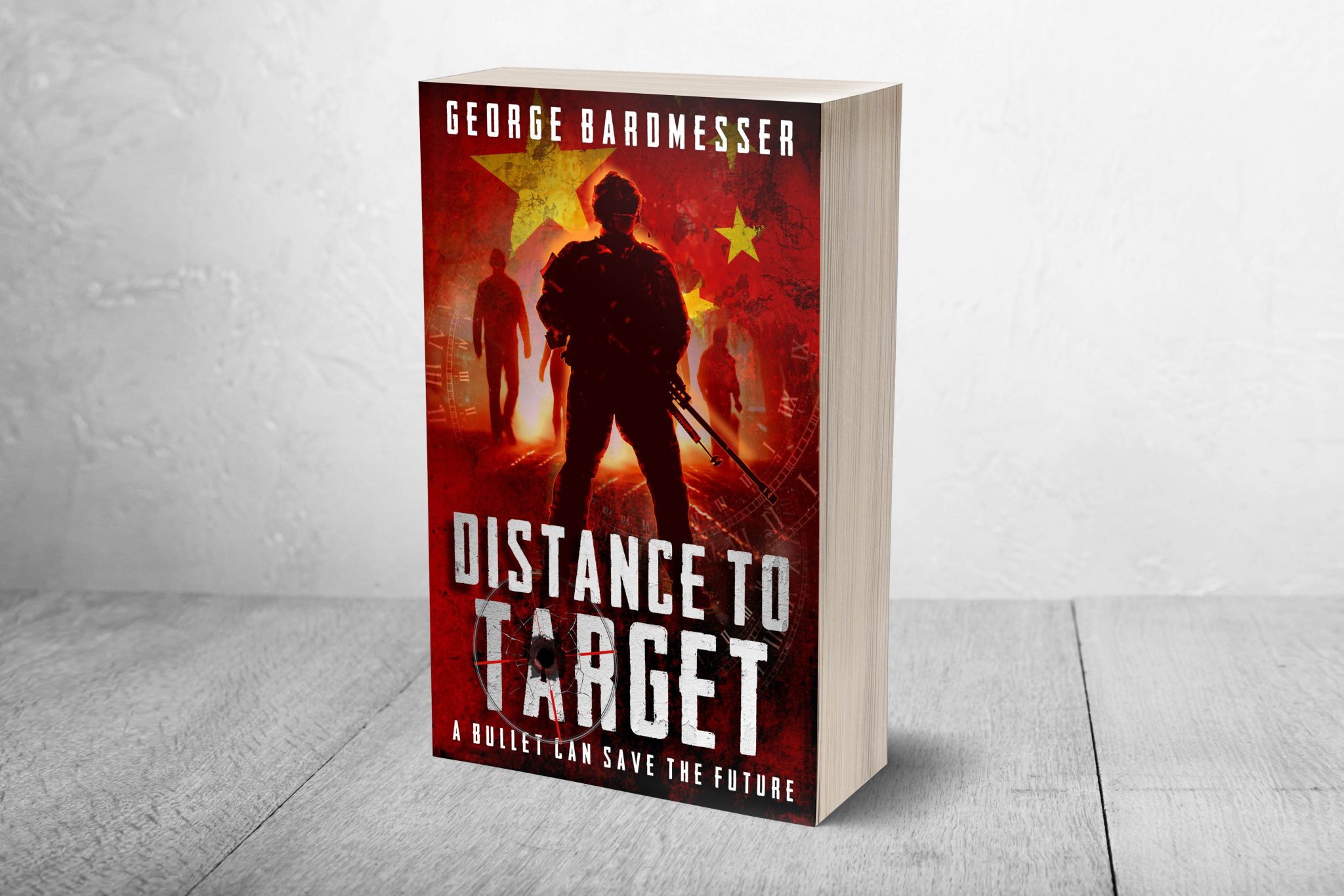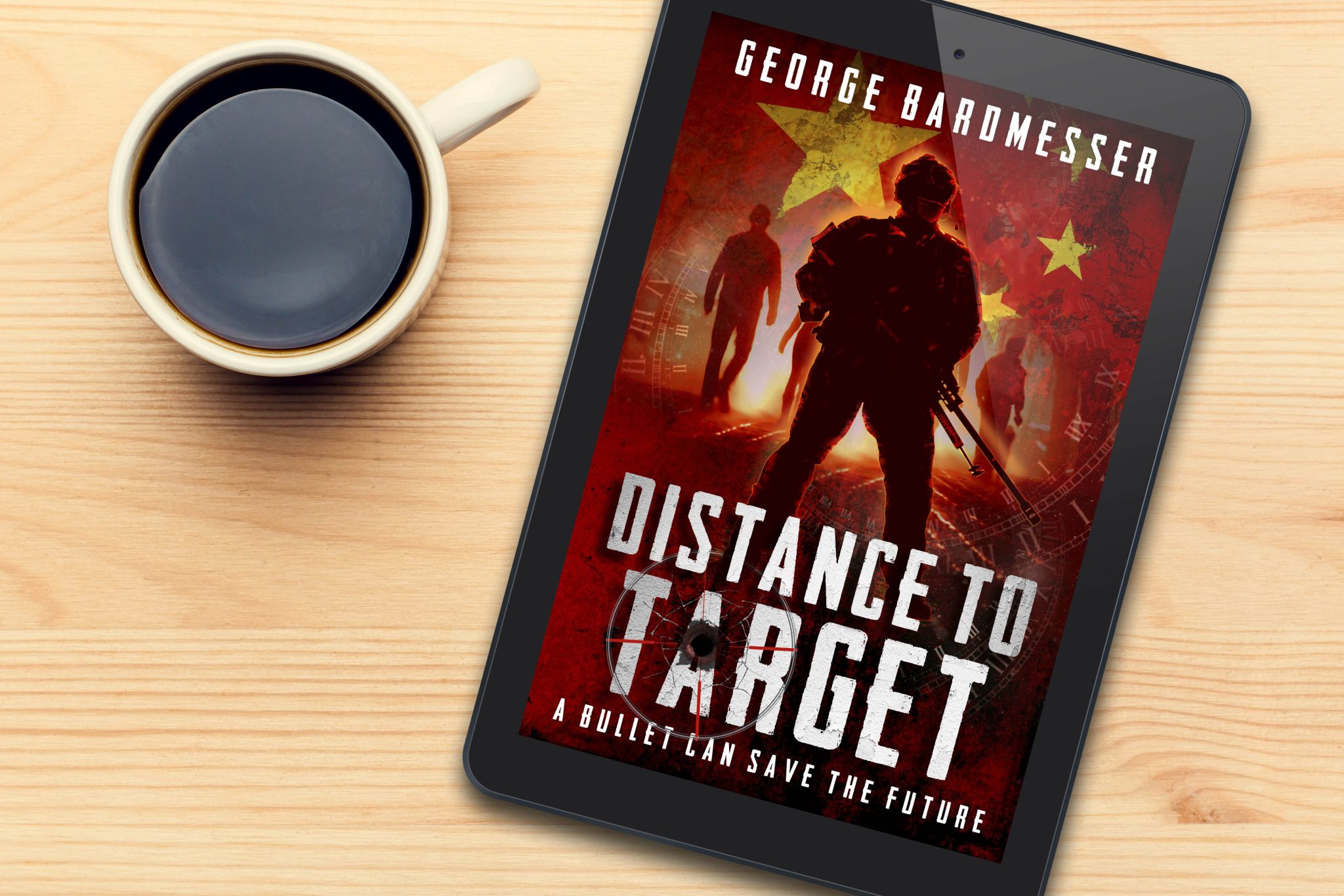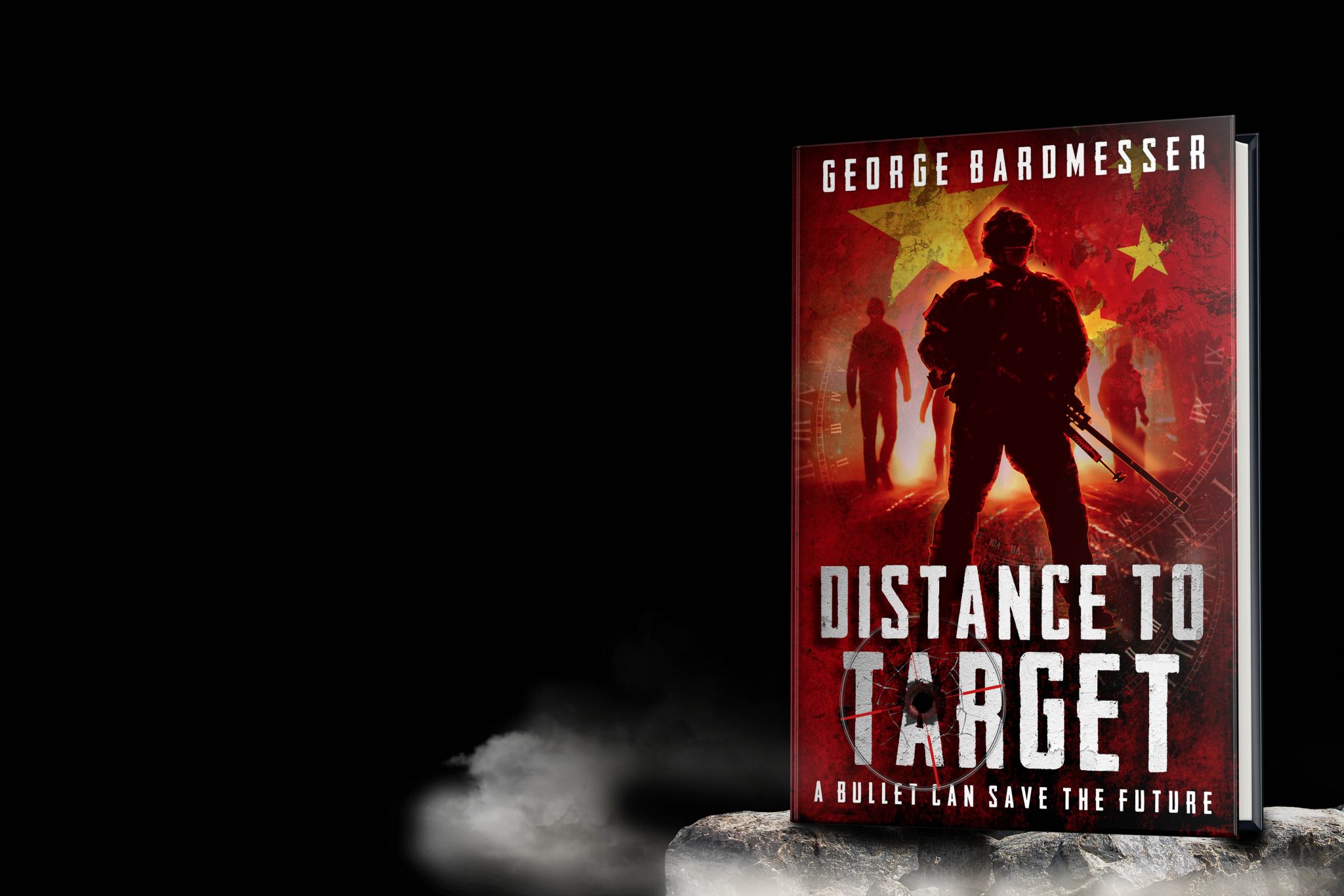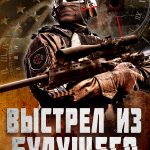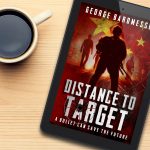Coming in May 2022

George Bardmesser
DISTANCE TO TARGET
A BULLET CAN SAVE THE FUTURE
Tyler Waterston was sent back in time from the 22nd century to 2021 to kill President Jeremiah Finnegan and Vice President Pamela Morris. The impossible shots, from 3,187 meters out, prevented the emergence of the Finnegan Plague, which would have turned many humans into rabid, cannibalistic monsters. With the timeline changed, Tyler has been living quietly under an assumed identity.
Meanwhile, the future is not done with him, since China’s new president is about to embark on a massive biological warfare buildup that endangers the entire human race. Tyler’s new mission is to put a bullet from 3,467 meters out through the man who becomes China’s President in 2029, and who will initiate the biowarfare program in 2032. To stop the apocalypse, Tyler must take the impossible shot at the G7 summit in Canada in 2031. His other mission is to stay alive and out of the clutches of the U.S. government, who still consider him the highest-value target on its list — and the NSA thinks it has a lead.
Once again, for Tyler, failure means the end of the human race.
George Bardmesser
DISTANCE TO TARGET
A BULLET CAN SAVE THE FUTURE
Copyright © 2021 by George S. Bardmesser. All rights reserved.
No part of this publication may be reproduced, distributed, or transmitted in any form or by any means, including photocopying, recording, or other electronic or mechanical methods, without the prior written permission, except in the case of brief quotations embodied in critical reviews and certain other noncommercial uses permitted by copyright law. Disclaimer: This is entirely a work of fiction. Names, characters, businesses, places, events and incidents are either the products of the author’s imagination or used in a fictitious manner. Any resemblance to actual persons (living, allegedly living or dead) or actual events is purely coincidental
Note to readers
While this book can be read as a standalone work of fiction, many of the events inevitably trace their history to what happens in the first book, FUTURE SHOT. Thus, reading FUTURE SHOT: A Bullet Can Change The Past is strongly recommended before beginning the current book.
George S. Bardmesser
Chapter 1
Fort Meade, Maryland
2029
The conference room on the third floor of the black glass building known as OPS2A is one of the most secure rooms that the National Security Agency possesses. Even coming near it requires multiple authentications and authorizations. It is shielded from every form of electronic, audio, and video surveillance. No electronic device is allowed inside. To the extent known science permits, any conversation within it can be assumed to stay there.
The conversation William Cochran is about to have with Antonia Diaz, Grant Peterson, and Eugene Garibaldi is the strangest one he has ever had with his subordinates. He is about to tell them that he solved the crime of the century. He is about to tell them how they can find PHANTOM—the man who eight years earlier appeared out of nowhere, shot and killed President Jeremiah Finnegan and Vice President Pamela Morrison from a distance of nearly two miles, and then vanished into thin air. They are about to think that he has gone off the deep end. He again wonders, briefly, if they might be right. He will do his best to convince them otherwise.
Cochran is fifty-seven years old, and, in a previous life, served in the Navy in the Office of Naval Intelligence. After retiring from the Navy, he joined the NSA and now heads RAPTOR—an agglomeration of the NSA’s domestic surveillance efforts. He is an early riser, a midnight-oil burner, and a tough boss. He is known as a strategic thinker within the agency.
“Thank you for coming,” he opens the meeting. Since he is the boss, the other three people nod politely, knowing that not coming wasn’t really an option. “I am going to get right to the point, because if I am right, we have a lot of work to do.
“All of you know that for the past eight years, every law enforcement and intelligence agency in the United States have been looking for the man who assassinated President Finnegan and Vice President Morrison. All of you know that those efforts, including our own, have
failed. No agency has been able to find a trace of PHANTOM, and this failure is the biggest black mark—an ongoing black mark against all of us. I believe I have come up with a new approach to how to think about our quarry. I believe that if we re-frame our own thinking and look at the facts from a different perspective, we will finally make some headway.”
The other three people in the room are certainly interested. To succeed in tracking down PHANTOM, after eight years of failure, would mean the kind of career boost that one can only dream about. More than that, the challenge posed by PHANTOM has driven a thousand analysts to drink. Can Cochran really offer something that nobody has thought of before?
Cochran continues.
“As you all know, there are two facts about the assassination that simply defy any explanation. No agency has been able to find any trace of PHANTOM prior to March 4, 2021—and this alone is inexplicable. How can a man of such supreme talent exist, and yet leave no evidence of his existence before that date?
“I, therefore, propose the first part of my theory: PHANTOM did not exist until March 4, 2021, when he came to the jewelry store in Pierre, South Dakota. What that means is another issue that I will come to shortly. In the meantime, let us accept as reality that we cannot find any trace of him, not because we haven’t looked hard enough or under a sufficient number of rocks, but because there are no traces to find.
“The second, even odder, fact is that PHANTOM knew months, if not years, in advance where exactly— down to a few centimeters Finnegan and Morrison would be located at precisely 4:37:23 PM on that day. He knew these things even though no one else, not even the Finnegan White House, knew or even suspected them, until a few days before the event.
“Until now, tremendous effort has been directed at the so-called “traitor on the inside” theory—that somebody in the White House, perhaps a staffer, perhaps a member of the Secret Service, betrayed Finnegan and Morrison, and communicated that information to PHANTOM or to his handlers, prior to the event. To this day, there is no explanation of how that person could have had knowledge of the event long before it was scheduled, with the inevitable inference that the suspected insider must have been in a position to influence the selection of the site.
“Every single person in the Finnegan White House and the Secret Service who could possibly have had advance knowledge of the event, or be in a position to influence or leak the details, was investigated thoroughly. Every one of them passed repeated polygraph tests. Every one of them underwent a deep dive into their own backgrounds—electronic, financial, personal. It is a finite number of people, totaling perhaps a hundred and change, at most, and that includes dozens of people who are only barely plausible as suspects.
“Multiple agencies, including our own, have investigated every single possible suspect. Those deep dives uncovered plenty of shady stuff, including criminality, graft, spying for China, Iran, and Russia, kickbacks, campaign law violations, insider trading, influence peddling in exchange for money or sex, all sorts of sexual improprieties and crimes, numerous other illegalities, leaks to journalists (authorized and not), and so on. Even by Washington standards, the corruption of the Finnegan administration was beyond anything imaginable, once the details started coming out. But what they did not uncover is the mystery insider. If there was an insider in touch with PHANTOM or with someone who passed information to PHANTOM, multiple and exhaustive investigations have utterly failed to unearth him or her.
“Yet the stubborn fact remains—PHANTOM knew. He knew things he could not possibly know. He knew things nobody could possibly know. He knew things that were physically impossible to know, because that information did not and could not exist at the time. And yet he knew. The second part of my theory that I therefore propose is that there is no insider. PHANTOM did know—but not because he had a secret connection to the White House, or because some traitor within the Finnegan administration was feeding him information.
“Thus, my theory says that PHANTOM succeeded in assassinating Finnegan and Morrison because years before the Troy event, he had perfect knowledge of where they would be on that day. Years before, he had perfect knowledge of the weather on that day and the conditions for the shots.
“With that in mind, recall how Arthur Conan Doyle’s fictional Sherlock Holmes is quoted as saying ‘When you have eliminated the impossible, whatever remains, however improbable, must be the truth.’
“I propose that what remains is a simple explanation, however absurd it sounds: PHANTOM is a time traveler from the future.”
Chapter 2
Islamorada, Florida
2029
Tyler is making good progress on restoring a 1973 Mustang in his garage, which he had converted to a workshop, complete with all the tools and air conditioning. Without the air conditioning, the Florida heat and humidity would make the garage space unbearable most of the year. The car is in decent shape by now—the engine is fully rebuilt, the car’s body is restored. The suspension and the transmission took some doing, but he eventually managed to scavenge the right parts from a junkyard in Fort Myers, a roughly three-hour drive from Islamorada. The seats and the entire interior sport new leather, and the instrument panel mostly works. A big challenge is the radio working 1973 radios for the Mustang are almost impossible to find, and the more modern ones, for later models, are mechanically incompatible with the slot into which the radio mounts
His phone chirps with a notification. The sound, a playful piano riff, is one he is not familiar with, so it’s not email or text. He walks over to the table, wiping the sweat off his face with a towel, and picks up the phone. A FedEx app shows the little circle with the notification message. He taps the app icon, and the message opens: DRONE WITH PACKAGE ARRIVING IN 10 MINUTES.
This is unusual and cannot be good news. There is absolutely no reason for anyone to send Tyler FedEx packages. None. He waits a few minutes, thinking about who could possibly be sending him something. No one comes to mind. He eventually opens the garage door and steps out onto the driveway, into the Florida sun. He waits as the application, now synced to the drone’s beacon, shows the countdown to the drone’s arrival time.
He hears the buzzing of the drone bearing a FedEx package as the little insectoid machine approaches from the north, the buzzing growing a bit louder as it hovers over the driveway. The phone app says PLEASE ACKNOWLEDGE DELIVERY OF THE PACKAGE in a gender-neutral voice. An icon then pops up, with the words CONFIRM RECEIPT OF PACKAGE. Tyler taps the icon to confirm as the insectoid contraption deposits the large envelope several feet from him. The phone chirps again, the image of the package on the driveway and him standing next to it, as seen by the drone’s camera, delivered to his phone. The drone rises higher, the buzzing of its rotors fading in the distance as it heads back to its base somewhere north.
Tyler picks up the envelope with Tom Pierce and his Islamorada address printed on it, turning it over. The label lists the name of the sender as Garrett Jefferson. Colonel Jefferson, the man who, in the year 2114, sent him on the mission to 2021 to kill President Finnegan and Vice President Morrison, does not exist and will never exist, since he will never be born in the 2060s, given the timeline change. It is a name that cannot be.
Tyler goes inside his house. He uses soap to get the dirt and grease off his hands at the sink in the bathroom, then washes his face and neck. He then sits down at a desk in a bedroom that they have informally converted into an office. He turns the package over again, but there is nothing more he can deduce from the envelope. The sender address is in New York and means nothing to him. He stares at the envelope for a minute, but finally decides that the envelope won’t open itself. He pulls the tab to tear the envelope open and shakes the contents out. A flash drive and a note fall out. In printed letters, the note says THE PASSWORD IS YOUR NAME.
Since the package is addressed to Tom Pierce, it doesn’t take a genius to realize that the name in question is not Tom Pierce. He turns the flash drive over in his hand, thinking. He then takes a computer that he purchased some time ago, but has never used. He makes sure the machine is disconnected from the Internet and its wireless card is turned off. He inserts the flash drive into the USB slot.
A second later, the computer asks him for a password.
The name Tyler Waterston does not exist and will never exist now. The only person in the universe who can possibly know his real name is him. His real name vanished eight years ago, when he put two bullets through Finnegan and another one through Morrison, changing the timeline forever. There can never be another person who knows that name.
He types Tyler Waterston into the password field. The flash drive icon opens, showing multiple directories and files.
The files tell him that in December 2029, Politburo Member Zheng Jun-Hua ascends to power in China in a coup. Shi Jiangfeng, the current president, “retires,” and Chinese media never mention his name again. The ideogram character for “Jiangfeng” itself becomes unofficially banned in China, and any individual who is already named “Jiangfeng” is invited for an informal chat with the local Communist Party authorities, who recommend in no uncertain terms that he change his given name.
In 2032, President Zheng launches a massive biological warfare program, aiming to develop a pathogen that is genetically targeted at non-Asians. Known to history as the V31-La8N3-Lymphatic-Node Binder, it gets loose in 2034 and wipes out nearly 98 percent of humanity. The genetic targeting fails—it turns out that Asians are just as susceptible to V31-La8N3 as anyone else.
A year before President Zheng launches the biowarfare development program, on May 16, 2031, a G7 summit takes place in Vancouver, Canada. President Zheng attends the summit. Several photo ops take place, one of them on the waterfront of the Vancouver Harbor, near a large convention center building called Canada Place, with the smiling G7 attendees standing on a pier near the water and facing south, toward downtown Vancouver. The photos and videos capture them with their backs toward Vancouver Harbor, with the northern shore and the city of North Vancouver visible in the distance, over two miles away.
Someone in North Vancouver looking south over the harbor through a scope would see President Zheng as second from the left, wearing a black suit and standing with his back to him. The President of France, wearing a grey suit, stands on the extreme left of the G7 lineup and just to Zheng’s left, as seen from North Vancouver. The Prime Minister of Italy, a bald man in a blue pinstripe suit, stands to Zheng’s right.
The files specify details of the security precautions that will protect the summit. They detail the impossible shot he is to take from 3,467 meters out, from across the harbor, the precise time of the shot, the exact geolocation coordinates of the target, and the location from which he is to take that shot. They contain videos of the G7 attendees from multiple angles, all of them showing the attendees standing near Canada Place, not far from the pier’s end. Zheng, being the only tall Asian man out of the seven, is easy to identify. The only other Asian man, the Prime Minister of Japan, is five feet five inches tall and stands first from the left, as seen by the cameras that look north, facing the attendees. To someone in North Vancouver looking south through a scope, he would be the rightmost of the G7 leaders as they stand with their backs to him. Identifying Zheng Jun-Hua, the target, is therefore straightforward.
It appears that Tyler’s retirement in tropical paradise is over. The future is not done with him.
There are three people he needs to talk to.
There is one man he needs to kill.
Chapter 3
Beijing, China
1991
Ministry of State Security Section Head Zheng Jun-Hua once again mentally reviews everything he knows about Senator Jeremiah Finnegan, the senior member of the visiting U.S. Congressional delegation. The delegation, which is in Beijing for a week of “fact finding,” includes four members of Congress, two from the House Armed Services Committee, and two from the House Foreign Affairs Committee. Three are known as anti-Communist hardliners. The remaining congressman is eighty-six years old, and is of only marginal interest to the Ministry of State Security, since recruiting him is impractical and not worth the attempt.
Jeremiah Finnegan, the visiting Chairman of the Senate Foreign Relations Committee, however, is of great interest to the MSS, and especially to Section Head Zheng. His department’s job is to recruit visiting Western government officials, using whatever means are suitable. In the short run, the MSS asks for very little from those it recruits—a little classified information here, a little help in promoting someone China wants in a more senior position there, perhaps a step up the career ladder in some Western Ministry of Defense, Ministry of Foreign Affairs, or intelligence service. The Ministry of State Security knows that it will all pay off in the end. China can afford to be patient.
Zheng’s section has a particular focus on Americans. A great deal of preparation has gone into Jeremiah Finnegan’s visit, and it has nothing to do with the official agenda. That agenda includes an hour long meeting with representatives of China’s National People’s Congress, a visit to the Great Wall, a tour of the Forbidden City, meetings with people from the Ministry of Foreign Affairs, a visit to China’s Central Bank, an opera, and so on. Jeremiah Finnegan even has a speech to give at Peking University, on the subject of international relations and the law. None of it has the slightest significance in the larger scheme of things, since everyone understands perfectly that the “fact-finding”, which the congressmen and Senator Finnegan are here for, is nothing more than an all expenses paid vacation in an exotic locale under the guise of official U.S. government business.
The file on Jeremiah Finnegan is extensive, covering his childhood in Connecticut, his struggles in college, which he barely passed, his law school years, when he was nearly expelled for plagiarism, his short, undistinguished, and failed legal career as a public defender, and his nineteen years in the Senate after being first elected in 1972. Zheng, who is fluent in English, has watched countless videos of Jeremiah Finnegan speaking at campaign events, in Senate committee hearings, giving interviews and offering meandering, mind-numbing speeches on the Senate floor. He has read everything Jeremiah Finnegan has ever written. He believes he has a good feel for his recruitment target. Zheng, at age twenty-nine, is very young for the position he holds—the youngest Section Head in the Ministry of State Security.
Unlike many people in the MSS, where connections matter as much as they do everywhere else in China, he has reached his position of Section Head due to innate talent. That talent is natural-born psychology. He has never formally studied the science of psychology, focusing his university studies on electrical engineering and English instead, but upon graduation, after being recruited by the MSS, his superiors discovered his unusual abilities. Zheng has an off-the charts sensitivity for non-verbal cues that people give off involuntarily. To him, even the most infinitesimal gestures, tiny changes in facial expressions or body posture, small eye movements, or changes in voice pitch or timbre, all speak volumes, as if the person’s innermost thoughts and desires are written on their faces.
It is a talent that many people possess to a greater or lesser extent, and many successful psychologists train themselves to consciously recognize these things. Magicians and illusionists exhibit the same skill when they pretend to read someone’s mind, when, in fact, all they are doing is processing the non-verbal cues. Zheng’s talent is purely organic, and, due to a lucky roll of the genetic dice, an order of magnitude more sophisticated than even the best illusionists.
Zheng, of course, is neither a mind reader nor a telepath. Not all people are obvious with their non-verbal communication, and some are harder to read than others. But he is a unique empath of a high order, someone who can read an adversary’s body language and then translate it into something actionable. To use an English expression, sometimes he can read people as if they were an open book.
Virtually every target of his efforts has a weakness. Are they in debt? Do they desperately need money? Are they on the prowl for sex? Do they want sex with men? Boys? Are they thwarted in their career ambitions? Do they hate their boss? Do they feel adrift in their personal life? Are they unhappy with their spouse? Do they question the politics of their own country enough to aid China? What arguments can be used to make them think that helping China is their own decision?
Recruitment of an intelligence asset is a delicate process, but, statistically, close to ninety percent of actionable weaknesses fundamentally come down to money or sex. Occasionally ideology, or, more rarely, some personal conflict or grudge, come into play. Whatever it is, Zheng is confident that if he spent enough time observing Jeremiah Finnegan, his weakness will reveal itself, as if it were tattooed on his forehead.
He watched the American delegation arrive at the airport, though Finnegan did not notice him there. He was in a uniform worn by passport control officials, and thus, for all practical purposes, invisible to the Americans—just another uniform among many, in the background of a bustling airport. And right now, he is getting ready for that all-important first close-up look at the target of his recruitment operation.
He is currently dressed in an ill-fitting dark suit that functionaries from the Foreign Ministry typically put on. His shoes are inexpensive, his shirt white, just like everyone else’s, his tie a boring dark red. His haircut is identical to those of a dozen other people in the room who are roughly his age—this is done precisely to make him as unremarkable as possible.
He is playing the role of a minor Foreign Ministry bureaucrat assisting the foreign dignitaries with logistics of the visit, forgettable even before their eyes move over him to the “important” National People’s Assembly officials they are here to meet. The Americans are unaware that the only important person in the room is Zheng, and everyone else is of little consequence.
Senator Finnegan has already seen a few people who look similar to Zheng, and will have no reason to notice him or think twice about him. Zheng knows that Finnegan most likely will be unable to tell the difference, since to Finnegan, all Chinese men look more or less the same, except for their height. His own, at nearly five feet nine inches, is above average for China—which is why, when many of the other people in the room were selected, being above average height was an important consideration.
The room is large and ornate, with oak paneling and a long mahogany table in the middle of the room. The American delegation will sit at one side, with Finnegan in the center. The Chinese representatives, led by Chen Weiqing, Finnegan’s rough counterpart in the National People’s Assembly, will be on the other side, discussing proposed improvements in bi-lateral relations, future visits to Washington, trade cooperation, and other nonsense. The discussion itself is meaningless, and Chen has zero authority to say or do anything without approval from the Politburo. The National People’s Assembly is little more than decoration, analogous to a Christmas tree ornament, and decides absolutely nothing of any significance. But visiting fools (like Finnegan) think that it is somehow equivalent to the U.S. Congress.
Zheng himself, pen and notepad in his hands, will sit three feet behind Chen and to his left, where he will be able to see Finnegan clearly, observing him for the entire duration of the meeting. The table that normally occupies the room has been replaced for this occasion with one that is two feet narrower— putting Zheng two feet closer to Finnegan than he otherwise would be. Multiple cameras are set up to record the meeting. One cameraman is hidden behind a wall. His job is to specifically film Finnegan with a high-resolution camera, so that every slight twitch of Finnegan’s body and face is captured.
To Zheng’s right and slightly in front of him will sit a young female Ministry of State Security officer named Liu Jia-Yi, who is dressed in a red business suit. Her job is to occasionally smile at Finnegan in a business-like manner, that might, or might not, be interpreted ambiguously. Zheng doubts that it would be this easy and that a simple honey trap like this would work on Finnegan, although they have prepared multiple contingencies for such an eventuality. And although Liu will certainly do what she needs to do if required, her job this time is a little different.
Every once in a while, she is to lean forward and whisper something in Chen’s ear, so that Finnegan will “inadvertently” see her bra. On two occasions, she will stand up and put a note in front of Chen, and Chen will pretend to read it, then write something on the piece of paper, passing the note back to her. The writings mean nothing but give her an excuse to linger while bending forward, so that Finnegan can see and stare at the curve of her breasts a bit longer.
Having studied Finnegan extensively, these moments are of particular interest to Zheng, and he has spent many days selecting the best candidate for that role, among the many thousands of female MSS officers. He then had Liu and Chen practice for hours the specific movements that she would need to do, as she leaned down to him, or as her hand rested on the table while she leaned forward and passed the note to Chen. Zheng himself sat in the chair where Finnegan would sit, choreographing Liu, and seeing it from Finnegan’s perspective.
He then sat in the chair where he would sit during the actual meeting, visualizing the charade as it would play out, and as he would see it in real life. Liu is a good actress, though, in all fairness, she is not asked to play Lady Macbeth in this little drama—she only needs to do a few moves that will permit Zheng to assess Finnegan’s response to her.
Chen, despite his nominal title as a chairman of the National People’s Assembly committee dealing with foreign affairs, understands who gives the orders in China for an operation such as this, and would not think of complaining. Liu, obviously, works for the MSS and has been detailed to his section. For her, failure in this assignment would be an unthinkable end to what was shaping up to be a promising career. Success would lead to future, more important, assignments.
To Liu’s right are two more MSS people pretending to be Foreign Ministry bureaucrats. To Zheng’s left are three other MSS people, all dressed similarly to him, in dark suits and red ties, one of them taller than him, one about the same height, one shorter. A few more = assistants—actual Foreign Ministry people, some aides from the National People’s Assembly, two of them women—are also in the room, farther back, near the wall. If all goes according to plan, Zheng will have an hour of having his eyes on Finnegan from about twenty feet away, without Finnegan ever realizing that the entire event was arranged for one specific purpose—giving Zheng plenty of eyes on-target time. He believes an hour will be sufficient to understand enough about the man to form a plan of action for recruiting him.
The American delegation enters the conference room. Several pretty uniformed schoolgirls, aged nine or ten, from a school for children of senior Party officials, wait in the room with bouquets of flowers. When the Americans walk into the room, there are handshakes, then each girl approaches the person she was instructed to meet, offering the bouquet to them.
The Americans accept the bouquets with nods and smiles, though Zheng can tell they are wondering what they will do with them a minute from now, and where they can put the bouquets, without appearing rude. Some do a small bow as a “thank you” gesture. Zheng’s expression is placid and neutral, as is proper for a junior Foreign Ministry functionary in a setting like this, but his eyes are glued to Finnegan.
He sees Finnegan accept the bouquet, nodding his thanks and smiling a bit goofily. Zheng finds the smile peculiar, and his inner radar begins to stir. Finnegan’s gaze is on the ten-year-old girl as she turns around to walk back. Finnegan watches her carefully, making an effort to keep his expression flat, wiping the smile off his face before it turns into a leer. The five schoolgirls, having delivered their bouquets to the American visitors, walk toward one of the side doors, leaving the room.
Finnegan’s head turns for a moment, watching them. He pretends casualness, glancing and gesturing at one of his colleagues, in order to extend the time when his head is turned, but Zheng can see Finnegan’s eyes caress the body of the little girl. The gesture to his colleague is a cover, a distraction. It is clear as day to Zheng that Finnegan’s real objective is to look at the little girl as long as possible.
He sees a fleeting expression of hunger in Finnegan’s eyes, his body posture changing minutely, the hands holding the bouquet gripping it just a shade more tightly. He sees a slight tightening of Finnegan’s jaw muscle. He sees Finnegan’s tongue wet his lips for an instant. He sees Finnegan force his gaze away from the schoolgirl with an effort, rotating his head back to the Chinese legislators they are supposed to have discussions with shortly.
The entire thing lasts perhaps two or three seconds, but in Zheng’s head, a klaxon is blaring. To an ordinary person, little of note has happened except for a silly ritual involving flowers for visiting dignitaries. Yet, as far as Zheng is concerned, Finnegan might as well have confessed on camera to being sexually attracted to very young girls. Incredibly, Zheng has identified Finnegan’s weakness even before the meeting began.
He feels his heart hammering with excitement, though anyone watching him would see nothing out of the ordinary. He now senses the path forward. He forces the excitement down, but he is already strategizing the next moves in his mind.

